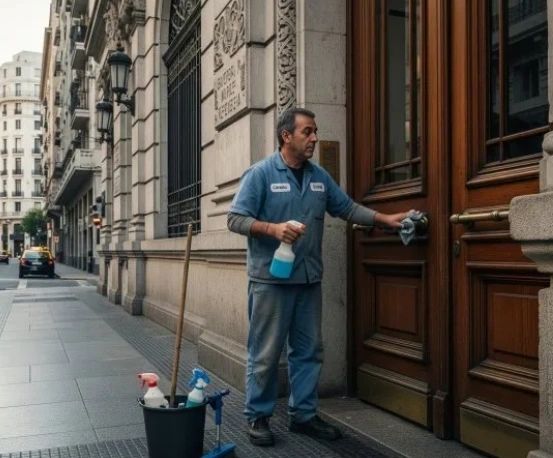BuySellBA
Administrator
HOA Fees Rose Over 5% in August, Outpacing Inflation: Causes, Impact, and Cost-Saving Tips - Ambito Financiero

Source:

 www.ambito.com
www.ambito.com
September 11, 2025
By Jose Luis Cieri
The average salary in Buenos Aires and the Greater Buenos Aires metropolitan area reaches $229,135. Experts explain which items are driving the increases, what to expect after the elections, and tips for reducing expenses.

Maintaining common areas is expensive, there are consortia that postpone repairs that can be carried out later.
In August, expenses ( and delinquency rates are also on the rise ) again rose above inflation. According to a survey of more than 130,000 households, the monthly increase was 5.05%, with an average value of $229,135 in the City of Buenos Aires and the Greater Buenos Aires area .
The figure contrasts sharply with the trend in previous months and highlights the causes of this shift, as well as the potential impact of the elections on the cost of living in buildings .
Octopus Proptech, a digital platform for managing condominiums, country clubs, and neighborhoods, reported that the year-over-year adjustment in expenses compared to August 2024 was 57.52%.
The comparison with previous years shows a different scenario. Between January and August 2024, the cumulative adjustment was 118.38%, with significant monthly increases. In the same period in 2025, the cumulative increase is 26.07%, a level similar to the adjustment that occurred in May 2024 in a single month.
“The contrast is stark: last year, at this point, expenses had already been adjusted by almost 100%, while this year the cumulative increase is just over 25%. This marks a clear, though not definitive, slowdown. The context continues to change, and there are sectors, such as public services, that could once again experience upward pressure,” explained Nicolás Baccigalupo , CEO and founder of Octopus.
Utilities, on the other hand, increased, accounting for 15.36% of total spending, impacted by gas consumption during the winter months. Other components included maintenance of common areas (17.57%), cleaning (2.33%), administration (5.99%), and insurance (3.69%).
Baccigalupo stated: “The strongest data we're seeing this month is stability. We're coming off a 2024 increase in expenses that accumulated almost 120% mid-year, and today, with a cumulative 26.07% increase in 2025, the difference is abysmal. This is starting to bring some relief to consortia, although we know that stability is still fragile and could be affected by increases in public services or new collective bargaining agreements.”
In this regard, he considered that the result in the province of Buenos Aires, with the Peronist victory, could herald greater pressure on variables such as the dollar and inflation, which would lead to some instability for the consortiums in the coming months.
"The positive fact is that so far this year, many consortiums have posted surpluses, even with reserves to cover maintenance projects that were impossible to sustain in times of high inflation. Previously, accounts were at zero or negative, and now we're seeing surpluses between income and expenses," Baccigalupo added.

Cleaning staff in front of a classic-style building in Buenos Aires, where maintenance costs impact monthly expenses.
When asked about where to file a complaint when excessive expenses are collected, Loisi stated that a limit should be set at the Assembly, which is the consortium's highest authority. He also noted that complaints against administrators can be filed online: in the City of Buenos Aires through the Buenos Aires City Government portal, and in the province through the Provincial Directorate of Legal Entities website .
Regarding disputes over non-payment, he explained that the Assembly can agree on facilities for defaulters—such as an installment plan or interest reduction—and, if there is no agreement, the administration can initiate legal action.
Regarding the role of tenants, Loisi clarified that paying expenses is not a legal obligation, but rather a contractual one: "If you don't pay, you can be evicted by the owner, who is always liable to the consortium."
1- Avoid paying overtime to building staff.
2- Compare the administration's budgets with those of other companies and suppliers.
3- Implement usage schedules for boilers and central heating to reduce gas consumption.
4- Place light switches with automatic shut-off in hallways and common areas.
5- Rent common spaces or the gatehouse to generate additional income for the consortium.
The coming months will be marked by the evolution of rates and the stability of the dollar and prices. "With owners committed to management and proper controls, expenses can cease to be a permanent problem and be adjusted within reasonable parameters," Loisi concluded.
www.buysellba.com

Source:

Expensas subieron más de 5% en agosto y superan a la inflación: causas, impacto electoral y cómo abaratar costos
El promedio en CABA y GBA llegan a $229.135. Expertos explican qué rubros empujan las subas, qué esperar tras las elecciones y consejos para reducir gastos.
September 11, 2025
By Jose Luis Cieri
The average salary in Buenos Aires and the Greater Buenos Aires metropolitan area reaches $229,135. Experts explain which items are driving the increases, what to expect after the elections, and tips for reducing expenses.

Maintaining common areas is expensive, there are consortia that postpone repairs that can be carried out later.
In August, expenses ( and delinquency rates are also on the rise ) again rose above inflation. According to a survey of more than 130,000 households, the monthly increase was 5.05%, with an average value of $229,135 in the City of Buenos Aires and the Greater Buenos Aires area .
The figure contrasts sharply with the trend in previous months and highlights the causes of this shift, as well as the potential impact of the elections on the cost of living in buildings .
Octopus Proptech, a digital platform for managing condominiums, country clubs, and neighborhoods, reported that the year-over-year adjustment in expenses compared to August 2024 was 57.52%.
The comparison with previous years shows a different scenario. Between January and August 2024, the cumulative adjustment was 118.38%, with significant monthly increases. In the same period in 2025, the cumulative increase is 26.07%, a level similar to the adjustment that occurred in May 2024 in a single month.
“The contrast is stark: last year, at this point, expenses had already been adjusted by almost 100%, while this year the cumulative increase is just over 25%. This marks a clear, though not definitive, slowdown. The context continues to change, and there are sectors, such as public services, that could once again experience upward pressure,” explained Nicolás Baccigalupo , CEO and founder of Octopus.
Composition of expenses
Salaries and social security contributions, which are usually the most affected, received some relief in August because most bonuses were paid in the previous period. Their share of expenses was 27.84%.Utilities, on the other hand, increased, accounting for 15.36% of total spending, impacted by gas consumption during the winter months. Other components included maintenance of common areas (17.57%), cleaning (2.33%), administration (5.99%), and insurance (3.69%).
Baccigalupo stated: “The strongest data we're seeing this month is stability. We're coming off a 2024 increase in expenses that accumulated almost 120% mid-year, and today, with a cumulative 26.07% increase in 2025, the difference is abysmal. This is starting to bring some relief to consortia, although we know that stability is still fragile and could be affected by increases in public services or new collective bargaining agreements.”
Political and economic factors
The performance of expenditures is not isolated from the political situation. Baccigalupo warned: "The impact that the elections between now and the end of the year could have on expenditures is in line with what we have been observing: consortia have a direct impact on the election results because they are a true reflection of the country's economy."In this regard, he considered that the result in the province of Buenos Aires, with the Peronist victory, could herald greater pressure on variables such as the dollar and inflation, which would lead to some instability for the consortiums in the coming months.
"The positive fact is that so far this year, many consortiums have posted surpluses, even with reserves to cover maintenance projects that were impossible to sustain in times of high inflation. Previously, accounts were at zero or negative, and now we're seeing surpluses between income and expenses," Baccigalupo added.
What to do when faced with high expenses
Beyond the macroeconomic context, landlords and tenants are looking for tools to manage their costs. David Loisi , president of the Horizontal Property Consortium League Foundation, provided practical and legal tips for addressing the problem.
Cleaning staff in front of a classic-style building in Buenos Aires, where maintenance costs impact monthly expenses.
When asked about where to file a complaint when excessive expenses are collected, Loisi stated that a limit should be set at the Assembly, which is the consortium's highest authority. He also noted that complaints against administrators can be filed online: in the City of Buenos Aires through the Buenos Aires City Government portal, and in the province through the Provincial Directorate of Legal Entities website .
Regarding disputes over non-payment, he explained that the Assembly can agree on facilities for defaulters—such as an installment plan or interest reduction—and, if there is no agreement, the administration can initiate legal action.
Regarding the role of tenants, Loisi clarified that paying expenses is not a legal obligation, but rather a contractual one: "If you don't pay, you can be evicted by the owner, who is always liable to the consortium."
5 tips to save
When asked how to cut costs, Loisi recommended simple measures: "Don't offer overtime, compare management quotes with other providers, and rent out common spaces like garages or concierges."1- Avoid paying overtime to building staff.
2- Compare the administration's budgets with those of other companies and suppliers.
3- Implement usage schedules for boilers and central heating to reduce gas consumption.
4- Place light switches with automatic shut-off in hallways and common areas.
5- Rent common spaces or the gatehouse to generate additional income for the consortium.
Will the increases be halted?
With inflation falling, there's an expectation that expenses could keep up with this trend. Loisi believes this depends on transparent management and the owners' oversight: "With orderly administration, they shouldn't increase more than inflation. It's key that the owners review how the consortium's funds are spent."The coming months will be marked by the evolution of rates and the stability of the dollar and prices. "With owners committed to management and proper controls, expenses can cease to be a permanent problem and be adjusted within reasonable parameters," Loisi concluded.
www.buysellba.com

